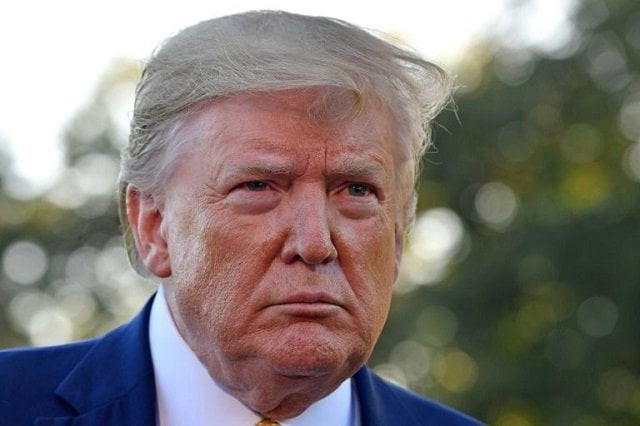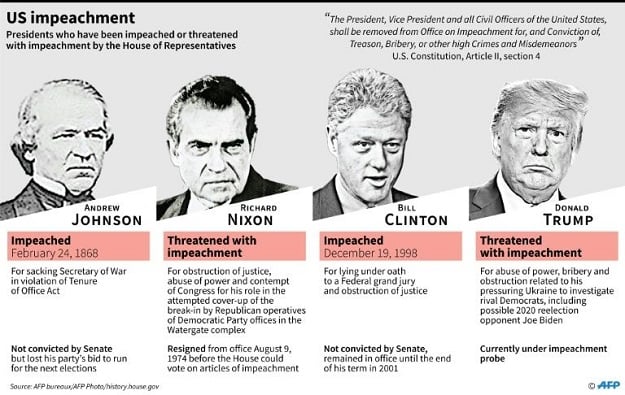Trump on trial: the road to impeachment
Following the hearings, the panel will vote on formal articles of impeachment

The House Intelligence Committee released its impeachment inquiry report into President Donald Trump. PHOTO: AFP
The 300-page report paves the way for the opening of impeachment hearings in the Democratic-controlled House Judiciary Committee.
The report found "overwhelming evidence" of misconduct and obstruction of justice by Trump and accused him of subverting national security by pressuring Ukrainian President Volodymyr Zelensky for political dirt on Democratic rival Joe Biden.
Democrat report makes forceful impeachment case against Trump
The president allegedly stalled $400 million in military aid and a White House visit for Zelensky to strong-arm Kiev -- which is at war with Russia -- into opening an investigation into Biden.
Democrats appear determined to hold an impeachment vote in the House of Representatives by the end of the year, which could see Trump go on trial in the Republican-majority Senate in January.
 US presidents who have been impeached or threatened with impeachment by the House of Representatives. PHOTO: AFP
US presidents who have been impeached or threatened with impeachment by the House of Representatives. PHOTO: AFPSteps of the process
The House Judiciary Committee is to hold its first impeachment hearing on Wednesday featuring four prominent legal scholars discussing the "constitutional grounds for presidential impeachment."
Further hearings are expected next week, but a list of witnesses has not yet been released.
Unlike in the initial fact-finding phase in the Intelligence Committee, Trump and his attorneys can take part, submitting testimony, attending the hearings, reviewing the evidence and questioning witnesses.
Trump's White House counsel Pat Cipollone refused an offer to participate, however, calling the inquiry "baseless and highly partisan" and in violation of "fundamental fairness."
Cipollone reserved the right to join in subsequent Judiciary hearings, in which the charges are debated and further witnesses could be called.
Following the hearings, the panel will vote on formal articles of impeachment, the political equivalent of an indictment.
The US Constitution's definition of impeachable offences is broad: "treason, bribery, or other high crimes and misdemeanors."
Democrats are weighing at least two counts: abuse of power and obstruction of justice.
There is no formal timeframe for the impeachment process.
But Democrats have aimed to hold a full House vote on articles of impeachment before the body goes on break for Christmas, December 25.
The articles of impeachment passed by the Judiciary Committee will then be sent to the entire House for a vote.
Representatives will debate the charges in a phase that could take some time: in the 1988 impeachment of President Bill Clinton, House members spent more than 13 hours over two days arguing the case.
Passing the articles -- or "impeaching" the president -- requires a simple majority of the House.
 Three past US presidents who faced impeachment: Andrew Johnson (L) in 1868 and Bill Clinton (R) in 1974, who both survived trial by the Senate, and Richard Nixon in 1974, who resigned before he was formally impeached.PHOTO: AFP
Three past US presidents who faced impeachment: Andrew Johnson (L) in 1868 and Bill Clinton (R) in 1974, who both survived trial by the Senate, and Richard Nixon in 1974, who resigned before he was formally impeached.PHOTO: AFPDemocrats have control of the 435-member body with 233 members to the Republicans' 197, and the party has shown a united front, meaning approval is widely expected.
A vote to impeach would send the case to a Senate trial of a sitting president for only the third time in US history.
The chief justice of the Supreme Court would preside, and the 100 senators would sit as the jury.
Representatives from the House would act as prosecutors, with the president's attorneys presenting his defence.
Convicting Trump could be difficult, because it would require two-thirds of the Senate, and Republicans hold 53 of the 100 seats.
Senate majority leader Mitch McConnell would control the process and could keep it short with limited testimony and arguments, lasting two weeks or less.
He could also stretch it out: Clinton's trial lasted six weeks and accepted new witness testimony and evidence.
Trump fumes over impeachment drive during NATO summit
A complicating factor is that five of the Democratic presidential hopefuls are senators, and a January trial would hinder their campaigning ahead of the crucial first primary on February 3 in Iowa.
 Top US diplomat in Ukraine William Taylor (center) and George Kent (left), the deputy assistant secretary of state for European and Eurasian affairs, testify before the House Intelligence Committee. PHOTO: AFP
Top US diplomat in Ukraine William Taylor (center) and George Kent (left), the deputy assistant secretary of state for European and Eurasian affairs, testify before the House Intelligence Committee. PHOTO: AFPNo matter what the charges are, politics will have a big influence on the final vote.
With presidential and congressional elections looming in November 2020, Republican senators especially have to consider whether their constituents will favour voting to remove or protect the Republican president.



















COMMENTS
Comments are moderated and generally will be posted if they are on-topic and not abusive.
For more information, please see our Comments FAQ